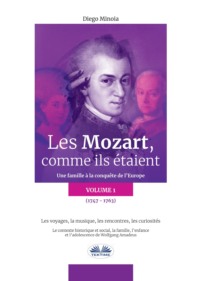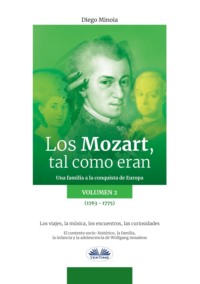
Полная версия
The Mozarts, Who They Were Volume 2
The risk therefore, for the Mozarts was particularly serious both at the level of possible infections and loss of earnings due to the forced isolation to which the inoculated subject had to be subjected. The practice continued to be used until 1796 when the vaccine introduced by Edward Jenner gradually led to the eradication of the disease.
In Paris, in that autumn / winter 1764, it snowed only once and the climate remained mild, at least this is what Leopold Mozart reports in his letters comparing the temperatures of the French capital with the much colder ones in Germany. On the other hand, the humidity and the rains were frequent, so much so that a silk rain cover was indispensable, which, apparently, almost everyone carried in the bag when they left the house.
The waterproof rain cover and the umbrella
Leopold was certainly used to protecting himself from the rain by using, like everyone in Europe up to that time, hoods or cloaks, so much so that he considered the rain cover a recent invention.
The fashion of the rain cover (note Leopold's use of the French term derived from parapluie) was imported to Paris from England, a territory with known characteristics of rainfall. In reality, the history of the rain cover derives from that, very ancient, of the parasol.
What we commonly call umbrella, in fact, is derived from its name its original meaning: to make shade.
This object is witnessed in ancient times in China and Japan as an attribute of Emperors and Samurai and a symbol of power reserved for them, but we have evidence of its use also in ancient Egypt, in classical Greece and in Imperial Rome.
The ceremonial parasol was used as a symbol of power also by the Popes, first, and later also by the Venetian Doges (who asked the Roman Pontiff for authorization to use it, too).
In epochs closer to us it seems that the custom of the parasol was brought to France (like many other things, including ice cream) by Caterina de 'Medici, in the 1500s, at the time of her marriage to Henry II.
From France the use of the parasol spread to England where in the 18th century, considering the prevailing climate in that territory, it was decided to use it also as a rain cover.
The new fashion then returned to France, where it became commonplace among the wealthier classes.
The frequent and abundant rains also caused the Seine to flood to the point, says Leopold, that many areas of Paris near the river were impassable and a boat had to be used to cross the Place de la Gréve (the current Town Hall square). In the same letter of 22 February 1764, Leopold Mozart announces that he plans to go to Versailles within 14 days to present the Opera before Wolfgang, the 2 Sonatas for harpsichord with violin accompaniment K6 and K7 (dedicated to Victoire, second daughter of King Louis XV) and the second Opera, Le and 2 Sonatas for harpsichord with violin accompaniment K8 and K9 (dedicated to Madame de Tessé, lady-in-waiting at the Court and animator of a famous cultural salon in Paris).
In a letter dated March 4, 1764, Leopold Mozart wants to dispel the prejudice, evidently widespread among his fellow citizens, that the French could not stand the cold. On the contrary, he writes, given that in Paris, unlike elsewhere, the shops of the artisans (tailor, shoemaker, saddler, cutler, goldsmith, etc.) remained open throughout the winter.
Not only that: the shops were open to for viewing by all passers-by and are illuminated in the evening with numerous lamps or appliques fixed to the walls, if not a beautiful chandelier in the middle of the room. Lighting was necessary because, as Leopold is astonished, these Parisian shops remained open in the evening until 10pm, and food shops until 11pm. The women in the house use warmers that they keep under their feet, made up of wooden boxes covered with tin provided with holes from which the heat came out, inside which were placed bricks or embers red-hot in the fire. The cold certainly did not stop Parisians of both sexes from taking walks and showing off in the Tuileries gardens, at the Palais-Royal or on the boulevards. In March, Leopold receives news from Salzburg: the court organist Adlgasser had been financed by the Archbishop to go to Italy to study the musical style that was so successful in Europe.
Leopold had certainly already thought that such an experience would also be necessary for little Wolfgang but this news probably confirmed his idea that the Archbishop, as he had done for Adlgasser (and for other Salzburg musicians, such as the singer Maria Anna Fesemayer on leave to study in Venice) would have financed at least part of the trip and allowed him to abstain again from the duties of his musical role at Court. On 3 March 1764, the Mozarts "lost" (much to the chagrin of the little Wolfgang of whom he was very fond) Sebastian Winter, the servant who had accompanied them from Salzburg for the whole journey to Paris. In fact, he had found a way to enter the service of Prince von Furstenberg as a hairdresser and left Paris to go to Donaueschingen where the Furstenbergs had their residence (which can still be visited today together with the brewery of the same name). Of course, one could not stay in Paris and frequent the beautiful world without a personal hairdresser-waiter, so the Mozarts hastened to find a replacement, a certain Jean-Pierre Potevin, an Alsatian who, given his origins, spoke both German and French well. However, the new waiter had to be suitably dressed, hence new expenses of which Leopold complains.
Providing some information especially addressed to Mrs. Hagenauer, Leopold Mozart takes the opportunity to display all of his opposition (perhaps a little underlined to highlight the sobriety of his ideas and of his modus vivendi) regarding French customs. Meanwhile, for Leopold, the French love only what pleased them and abhorred any kind of renunciation or sacrifice; in the poor times you could not find food that respected the precepts of the Catholic Church and the Mozarts, who ate in inns, were forced to break the ban by eating meat broth or spending a lot on fish dishes, which were very expensive. Fasting was not practiced by Parisians and Leopold, ironically, was anxious to ask for an official dispensation that allows his conscience to be calm while not respecting Catholic prescriptions relating to food.
Even the customs in religious practices are different than in Salzburg: no one in Paris used the rosary in church and the Mozarts are forced to use it hiding it inside the fur muffs that keep their hands warm, so as not to be subjected to curious or annoyed glances. The beautiful churches were few but on the other hand the noble palaces abound that highlight luxury and wealth. Even the carriages are symbols of extreme luxury, completely lacquered in laque Martin (the same one we have seen used for the snuffboxes) and embellished with paintings that would not disfigure in the best picture galleries. In the period of Lent then, unlike the German traditions that provide for the suspension of shows and dances, in Paris the period of reflection and penance is interrupted by inventing the "Ball of the virgins" also known as the "Carnival of the virgins". And here Leopold Mozart makes it clear what he thinks of the morality of the French.
Sex in France and Europe at the time of the Mozarts
While the concept was gaining ground that sexual pleasure was not the exclusive prerogative of man, but must also fall within the female sphere, erotic activity (both literary and practical) spread like wildfire and without the moral restraints that in the past was relegated to the secret of the bridal bed.
Of course, moral rules and laws still condemned promiscuity and prostitution was punished. In Vienna for example, by forcing the guilty girls (the poor ones, of course) to clean the city streets of horse excrement.
Love and sex are talked about and practiced throughout Europe but especially in Paris and Venice, the only city that, despite the ongoing decline of its power, could compete for the "dolce vita" with the French capital.
The search for pleasure as an end to itself became, first in the aristocratic world, but soon also in the bourgeois sections of the population, a way of thinking and living that for some even became an obsession.
To love, even outside of marriage (with discretion but without false modesty) became normal, as well as leaving without too many sorrows in view of a new "game" that led to other conquests.
Sex became an experience, for men and women (despite the permanent situation of social minority with respect to man), an achievement to be enumerated and cataloged (think of Mozart's Don Giovanni and his catalog, the perfect representative of that world that was about to disappear end of the century).
The 18th century is the century of seducers and libertines: Casanova (who in his biography lists 147 conquests) and the Marquis de Sade are perhaps the champions, and such have remained in the collective imagination.
The nobles, however, had to begin to suffer from the competition of new "objects of desire": the artists. In a historical moment that, if it does not invent the star-system at least consolidates it, actors and actresses, singers and dancers represent the "forbidden fruit" that attracted the desires of husbands and wives, eager to try new thrills.
However, it was always a question of whims and desires that were exhausted in the time span of a strong but not lasting passion fire or in menage in which the rich party financed the lover by offering a standard of living that could be "respectable".
Artists were rarely considered worthy to officially enter the blue blood pedigree.
Sex, in the century of the Mozarts, could be pure pleasure or a means for the conquest of money, power and positions kindly favored by those who, man or woman, have pleasantly enjoyed the relationship.
Certainly neither Leopold nor Wolfgang belonged to the category of careerists between the sheets: the marriage of the former was happy but certainly did not give him wealth or social advancements, that of the latter then, with the insipid Constanze (imposed on him by the crafty Mrs. Weber, who had finally managed to place even the least attractive of the three daughters) it was an obligatory choice.
As for dissolute conduct, on the other hand, Amadeus was not one to hold back, at least from the moment he found himself at his disposal far from his father's control. The affair with his cousin and the Viennese adventures with students and actresses of his plays are part of the often obscured story of his life.
In the 18th century the rich and powerful enjoyed, even in a non-figurative sense, their position of power which allowed them to dispense money and offices to their lovers; the latter having no problem moving from bed to tax collector's office or royal official.
If you were male you made a career for yourself, if you were female you used the influence obtained between the sheets to consolidate your role and to help relatives and friends by supporting their requests.
A single example, which circulated in Parisian salons at the time of Louis XV, can be illuminating. A Countess, who had already given up her arms in a singular encounter with the King, wrote him a letter (found by the monarch's servant by chance and delivered to Madame de Pompadour, the official lover) in which she asked him for 50,000 crowns, the command of a regiment for a relative of his, a bishopric for another relative ... and the liquidation of the Pompadour (which he evidently aspired to replace).
The wealthy aristocrats, when they were an "unfulfilled desire" for some girls and did not want to waste time intervening directly in the seductive game, hired a trusted valet, acting as a pimp, who lent himself to act as an intermediary and organize meetings (sometimes personally exploiting that particular role of power towards the bridesmaids, who did not refuse for fear of missing the greatest opportunity).
The practice of having lovers, moreover, came from high above. Louis XIV, the Sun King, had a disproportionate number of lovers of which about thirty "officers"; his successor Philip d'Orleans (regent until the coming of age of the future Louis XV) had two official lovers who worked simultaneously and without jealousy or reciprocal inhibition or for the countless meteors that quickly passed between the curtains of the royal bridal bed; Louis XV could count on about fifteen recognized lovers, plus the passing ones. And don't think that the High Clergy did no less.
For Carnival in every corner of the city there were dances, often with just a couple of musicians playing, according to Leopold, old out-of-date minuets. Approaching the time of departure for London Leopold is also thinking of relieving part of the gifts and purchases made in the previous stages of the journey by sending them to Salzburg and at the same time avoiding possible thefts or breakages due to the next loads and unloadings from the carriage with relative move to the inns.
A novelty that caused a sensation on Leopold were the so-called "English toilets" which in Paris were present in every private aristocratic palace. These are actually the first bidet models, equipped with cold and hot water sprayed upwards, which Leopold describes very briefly, not wanting to use inelegant terms. Even the bathrooms of the noble palaces are luxurious, with walls and floors in majolica, marble or even alabaster, equipped with porcelain chamber pots with gilded rims and jars with scented water and fragrant herbs.
Personal hygiene and bodily needs
We have previously seen how the use of terms related to bodily functions and the parts of the body involved was common in the Mozart family, in particular in the habits of Wolfgang and his mother.
But it is nothing to be shocked by!
At the time in Salzburg, but also in the rest of Europe, if we exclude the aristocracy (who lingered a little longer in the language to respect the alleged superiority over the lower classes) the use of trivial language was common.
After all, the habit with the natural functions of the body was much more "public" than it is today.
The bathrooms were practically absent in the vast majority of houses, if we exclude the noble palaces, and the bodily functions were not hidden as today but quietly carried out wherever nature had made its needs felt.
How to consider defecation a vulgar activity to be hidden at the time of the Sun King (Louis XIV) when it was actually considered a privilege reserved for the highest degrees of the court nobility to attend the "lever du Roi", the awakening of the King, including him sitting on the "throne" (equipped with a majolica vase and a table for reading and writing) that the sovereign used every morning to carry out his bodily needs?
And so, cascading from the King down, the activities of the body were considered natural and were carried out, if one was at home, in the chamber pot which was then emptied by throwing its contents out of the window.
The result of all this, added to the animal manure and the habit of throwing all kinds of garbage or processing waste on the street (there were no sewers or sanitation systems, except for some rare washing of the main and central streets of the cities ) was filthy streets and putrid cities.
If, on the other hand, you were out of the house, things got more complicated, not so much for the men who, thanks to the more practical clothes and the favorable physiology were able to find a secluded corner to relieve themselves, as well as for the women.
The aristocrats wore complex and overabundant dresses, with skirts, petticoats, bodices with strings and buttons, not to mention the "panier", a frame with concentric circles in wicker or whalebone, tied together by ribbons and fixed directly on the corset . How then?
A solution to every problem: the Bourdaloue was invented, a portable chamber pot equipped with a handle and formed according to the female shape, which was placed under the skirts by the maid and which allowed the grand lady, thanks to the fact that it had a strategically placed opening, to free themselves in public while respecting the concept of decency considered acceptable at the time.
However, it seems that at the beginning of the 1700s only three aristocrats out of a hundred wore underpants, either for convenience or because they were still considered a sinful garment by the Church (in the previous century they were worn and flaunted above all by prostitutes, as in Venice, where they were called "braghesse" and were imposed as an obligation for girls who were "working girls"). In public, it is said.
Of course, bourdaloue was used without problems, in the 1700s, on every occasion: during walks, during carriage rides, in the middle of a dance and, yes, even in church.
The term bourdaloue derives from the surname of Louis Bourdaloue (1632-1704), a very famous preacher who, thanks to his extraordinary oratory art, was called to Versailles to give his sermons in the Royal Chapel, in front of the King and the courtiers.
The sermons, however, were very long and, in order not to miss a single word (and not to leave their place, which represented a precise hierarchical order within the courtiers), the ladies resorted to bourdaloue, which allowed them to solve the problems of incontinence. without abandoning their place in church.
Leopold then communicates to Hagenauer the hope of a collection of 75 Luigi d'oro for the first Parisian concert of the young Mozarts, scheduled for March 10 at the Teatro del Signor Felix, which actually yielded 112. During their stay in Paris the Mozarts have way to also attend "shows" that were very rare in Salzburg, while in Paris were almost daily event: the hangings of criminals in Place de Grève (the current Place de Hotel de Ville, the Town Hall).
It is not known whether for having witnessed it or by hearsay, the story of the hanging of three servants (a cook, a coachman and a maid) who in the service of a rich widow to whom annuity payments were sent home every month, had stolen the astonishing sum of 30,000 Louis of gold. Such facts did not cause a sensation and it could happen that servants were hanged for even minimal thefts, even for only 15 sous. Leopold, a well-meaning bourgeois, thought it was right to make people feel safe.
On the other hand, it seems that it was not considered a theft to "skim money" at the expense of the masters: Leopold says that this is to be considered profit and not theft. Then as today, if the law was very hard on the poor, it was not so hard on the rich and powerful. Thus a notary, taking advantage of the sums of money entrusted to him and no longer able to repay them, went bankrupt and disappeared from circulation. They, therefore, had to be content with hanging his portrait.
In the last letter sent to Hagenauer from Paris on 1 April 1764, Leopold Mozart refers to an infrequent episode: an eclipse of the sun. For days the Parisian glassmakers had collected all the glass fragments left over from the work to prepare for the event, and had colored them blue or black for sale to those who wanted to observe the eclipse without having any damage to their eyesight. Those who were not satisfied with observing the eclipse from the road could go to the Observatory built by Louis XIV in 1667 and entrusted to the Italian astronomer and mathematician Giovanni Cassini (later naturalized French, as had happened, again under Louis XIV with the Florentine musician Giovan Battista Lulli who became Jean-Baptiste Lully). Unfortunately for the Parisians who had bought the colored glass, a heavy rain fell that day and the vision of the eclipse faded.
In compensation, however, the anticipation of the event had unleashed the superstition of those (and there were many since the churches that morning were stormed) who believed that the eclipse would poison the air or even cause plagues. Having scraped together a lot of money from the performances of the boys, Leopold writes to Hagenauer (who, remember, was his lender / administrator / banker) that he wanted to deposit 200 Luigi d'oro, at the Parisian branch of the Tourton and Baur bank, waiting to have them transferred to Salzburg. He also looks forward to collecting the proceeds of the next concert, scheduled for 9 April, with which he hopes to replenish the reserves with at least another 50 or 60 Luigi d'oro, without excluding the hope of obtaining more.
But how did the organization of public concerts work at that time? For private individuals, kings and aristocrats, they presented themselves, obtained an invitation, the performance was carried out and then waited (even for some time) for a gift in money or precious objects (if all went well). Public concerts with payment of an entrance ticket were not yet widespread at the time when the Mozarts were in Paris. The main organization dedicated to the proposal of musical concerts was the "Concert spirituel" which, since 1725, had the royal permission to have music performed in competition with the Parisian theatrical institutions. In particular, the concerts were organized during the period of Lent, when any profane entertainment was forbidden, and the programs included choral and instrumental music with interventions by the main virtuosos. These concerts were mainly frequented by the middle class and the lower aristocracy (the important aristocrats, as we have seen, organized them at home).
For paid public concerts, the organization provided for the presale of tickets through friends and acquaintances introduced in the Parisian salons who could circulate the news of the concert and sell the tickets to interested parties. Even the shops of the music publishers could be part of the booking and ticket sales points (in Vienna in the following years, this was the case for Wolfgang and also later, for Beethoven and others who became entrepreneurs themselves). The friends, therefore, contacted potential interested parties eight days before the concert and sold them concert tickets which, in this specific case, cost 1/4 of Luigi d'oro. If the price was the same as the one charged for the previous concert, which had collected 112 Luigi d'oro, then we can estimate the presence of 448 people at the Parisian exhibition on 10 March 1764!
A little selling trick, Leopold himself reveals, consisted in giving most of the tickets, in packets of 12 or 24, to ladies who, as such, would hardly have received any refusal to purchase from the courteous men who may have offered them. To prevent fake tickets from being printed Leopold Mozart had his seal put on the cards and the content was very concise: At the Teatro del Signor Felix, rue and Porte Saint Honoré, this Monday 9 April at 6 pm. This Mr. Felix's theater was actually a small private theater built inside his palace, where friends and noble guests delighted in acting in first person plays.
The two concerts given by the Mozarts were able to be organized thanks to the availability of the Theater, obtained thanks to the support of Madame Clermont, but above all thanks to a special authorization obtained from Mr. de Sartine, Lieutenant General of Police, on multiple interventions by Mozart supporters: the Duke of Chartres, the Duke of Duras, the Count of Tessé and many other ladies. Why was authorization needed to organize concerts? The reason depends on the fact that the King had granted some Parisian institutions "privileges" which provided for the exclusivity in the organization of certain shows: L'Opera (L'Académie Royale de Musique) had the exclusive right to organize theatrical performances, the Concerts spirituels enjoyed the privilege of organizing concerts, the Comédie francaise and the Comédie italienne were the only ones authorized to organize theatrical performances. What was the picturesque world of theater like in Paris?
The theatrical world in Paris at the time of the Mozarts
First of all it should be remembered that the profession of theatrics and the people who practiced it were at the time (and for centuries) considered immoral by the Church, so much so that the actors and dancers were subject to excommunication (for the musicians the speech was different because their art did not include excommunications and accusations of corruption of conscience).







